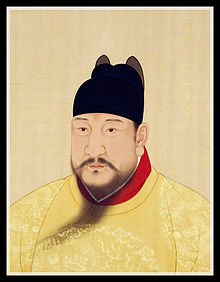Hongxi Emperor
| Hongxi Emperor | |||||||||||||||||
|---|---|---|---|---|---|---|---|---|---|---|---|---|---|---|---|---|---|
 |
|||||||||||||||||
| 4th Emperor of the Ming Empire | |||||||||||||||||
| Reign | 7 September 1424 – 29 May 1425 | ||||||||||||||||
| Predecessor | Yongle Emperor | ||||||||||||||||
| Successor | Xuande Emperor | ||||||||||||||||
| Born | 16 August 1378 | ||||||||||||||||
| Died | 29 May 1425 (aged 46) | ||||||||||||||||
| Burial | Xianling, Ming Dynasty Tombs, Beijing | ||||||||||||||||
| Spouse | Empress Chengxiaozhao | ||||||||||||||||
| Issue |
Xuande Emperor Zhanxun, Prince Jing of Zheng Zhanyong, Prince Jing of Yue Zhanyin, Prince Xian of Qi Zhanshan, Prince Xian of Xiang Zhangang, Prince Xian of Jing Zhanyu, Prince Jing of Huai Zhankai, Prince Huai of Teng Zhanji, Prince Zhuang of Liang Zhanyan, Prince Gong of Wei Princess Jiaxing Yuantong, Princess Qingdou Princess Qinghe Princess De'an Princess Yanping Princess Deqing Princess Zhending |
||||||||||||||||
|
|||||||||||||||||
| House | House of Zhu | ||||||||||||||||
| Father | Yongle Emperor | ||||||||||||||||
| Mother | Empress Renxiaowen | ||||||||||||||||
| Full name | |
|---|---|
| Zhu Gaochi (朱高熾) | |
| Era name and dates | |
| Hongxi (洪熙): 20 January 1425 – 7 February 1426 | |
| Posthumous name | |
|
Emperor Jingtian Tidao Chuncheng Zhide Hongwen Qinwu Zhangsheng Daxiao Zhao |
|
| Temple name | |
|
Ming Renzong 明仁宗 |
Emperor Jingtian Tidao Chuncheng Zhide Hongwen Qinwu Zhangsheng Daxiao Zhao
敬天體道純誠至德弘文欽武章聖達孝昭皇帝
The Hongxi Emperor (洪熙 [xʊ̌ŋɕí]; 16 August 1378 – 29 May 1425), personal name Zhu Gaochi (朱高熾), was the fourth emperor of the Ming dynasty of China. He succeeded his father, the Yongle Emperor, in 1424. His era name "Hongxi" means "vastly bright".
Zhu Gaochi was born on 16 August 1378 and was educated by prominent Confucian tutors. He often acted as regent in Nanjing or Beijing during his father's northern military campaigns.
He was disinterested in military matters but had prowess in archery.
Already in May 1421, during the reign of the Yongle Emperor, an order was issued for the suspension of Zheng He's maritime expeditions, apparently on account of their cost (although the order apparently did not affect the 6th voyage of Zheng He, staged around that time). Zhu Gaochi, as soon as he was enthroned as the Hongxi Emperor in September 1424, cancelled Zheng He's maritime expeditions permanently, burned down the fleet, and abolished frontier trade of tea for horses as well as missions for gold and pearls to Yunnan and Vietnam. He restored disgraced Confucian officials, such as the Yongle Emperor's minister of revenue Xia Yanji (imprisoned since 1421), and reorganized the administration to give high ranks to his close advisors. Hanlin academicians became grand secretaries, and they dismantled his father's unpopular militaristic policies to restore civil government. The Hongxi Emperor improved finances by canceling requisitions for lumber, gold, and silver. Taxes were remitted so that vagrant farmers could return home, especially in the overburdened Yangtze River Delta. The Hongxi Emperor appointed a commission to investigate taxes. He overruled his secretaries by ordering that grain should be sent immediately to relieve disaster areas.
...
Wikipedia
